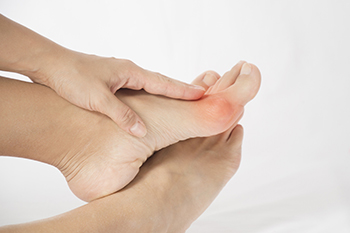 A bunion is a common foot deformity characterized by a bony bump developing at the base of the big toe joint. Bunions can cause symptoms such as foot pain or soreness, redness, inflammation, a burning sensation, or numbness. Mostly, bunions can make it very uncomfortable to wear shoes or spend long periods of time on your feet. Fortunately, there are a variety of treatments available for bunions. Conservative treatments, such as changing your footwear, padding the bunion, wearing orthotic inserts, avoiding activities that cause bunion pain, icing the affected area, and taking anti-inflammatory medications to reduce pain, are often effective. In more severe cases, surgery may be necessary to eliminate the bunion. For more information about bunions and to determine what treatment option is best for you, please speak with a podiatrist.
A bunion is a common foot deformity characterized by a bony bump developing at the base of the big toe joint. Bunions can cause symptoms such as foot pain or soreness, redness, inflammation, a burning sensation, or numbness. Mostly, bunions can make it very uncomfortable to wear shoes or spend long periods of time on your feet. Fortunately, there are a variety of treatments available for bunions. Conservative treatments, such as changing your footwear, padding the bunion, wearing orthotic inserts, avoiding activities that cause bunion pain, icing the affected area, and taking anti-inflammatory medications to reduce pain, are often effective. In more severe cases, surgery may be necessary to eliminate the bunion. For more information about bunions and to determine what treatment option is best for you, please speak with a podiatrist.
If you are suffering from bunions, contact Dr. Lubrina Bryant of District Podiatry, PLLC. Our doctor can provide the care you need to keep you pain-free and on your feet.
What Is a Bunion?
A bunion is formed of swollen tissue or an enlargement of boney growth, usually located at the base joint of the toe that connects to the foot. The swelling occurs due to the bones in the big toe shifting inward, which impacts the other toes of the foot. This causes the area around the base of the big toe to become inflamed and painful.
Why Do Bunions Form?
Genetics – Susceptibility to bunions are often hereditary
Stress on the feet – Poorly fitted and uncomfortable footwear that places stress on feet, such as heels, can worsen existing bunions
How Are Bunions Diagnosed?
Doctors often perform two tests – blood tests and x-rays – when trying to diagnose bunions, especially in the early stages of development. Blood tests help determine if the foot pain is being caused by something else, such as arthritis, while x-rays provide a clear picture of your bone structure to your doctor.
How Are Bunions Treated?
If you have any questions, please feel free to contact our office located in Washington, D.C . We offer the newest diagnostic and treatment technologies for all your foot care needs.